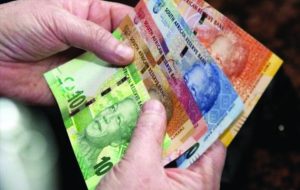


South African bonds led the sell-off in fixed income as the rand weakened to its lowest level in more than two years.
By Robert Brand and Colleen Goko
SOUTH Africa’s rand extended the worst decline among emerging-market peers as data showed the country’s economy had slipped into a recession for the first time since 2009. Stocks and bonds also fell.
The rand weakened as much as 2.6 percent after data showed gross domestic product unexpectedly contracted in the second quarter, raising the nation’s risk profile at a time when emerging-market assets are under pressure from a rising US dollar and global trade tensions. It also increases the chance of a credit downgrade by Moody’s Investors Service, which would plunge the country’s local-currency debt into junk status.
“Equities, bonds, rands… It’s awful,” said Abri du Plessis, a portfolio manager at Gryphon Asset Management Ltd. in Cape Town.
“I’m struggling to see any light. There is now a distinct possibility that there will be a downgrade by year-end and we won’t see the end of it for South Africa’s markets.”
The rand fell to 15.2238 per dollar by 12:12pm in Johannesburg. The yields on benchmark 2026 government bonds climbed 17 basis points to 9.17 percent. The benchmark stock index fell 0.4 percent, spurred by a 3.1 percent slump in the banking gauge.
The rout in emerging markets showed no sign of letting up, with most currencies weakening and an index of stocks heading toward a bear market.
South African bonds led the sell-off in fixed income as the rand weakened to its lowest level in more than two years. The MSCI Emerging Markets Index of shares dropped for a sixth day, set for its steepest slide in three weeks. Worst-hit was Indonesia, where shares tumbled the most in three years amid concern the depreciating rupiah will lead to higher corporate borrowing costs.
The declines added to concern investor nervousness is beginning to infect markets whose economies are more robust than others. The negative tone was set on Tuesday by a US manufacturing report that boosted the odds of further Federal Reserve rate increases and a strengthening dollar, and South African data showing the economy entered into a recession in the second quarter.
“This has become now increasingly an issue which is no longer just about EM fundamentals,” Sameer Goel, head of macro strategy for Asia at Deutsche Bank in Singapore, said in a Bloomberg TV interview with David Ingles. It’s “increasingly about contagion, which largely happens because of cross-holdings and the pressure of redemptions”.
Indonesian equities sank for a fifth day as policy makers attempted to support the rupiah through measures including interest-rate hikes that threaten to slow Southeast Asia’s biggest economy. Shares in the Philippines extended losses after a report showed inflation — spurred in part by currency weakening — surged past 6 percent last month, foreshadowing further potential rate rises there. — Bloomberg
Sorry. No data so far.

